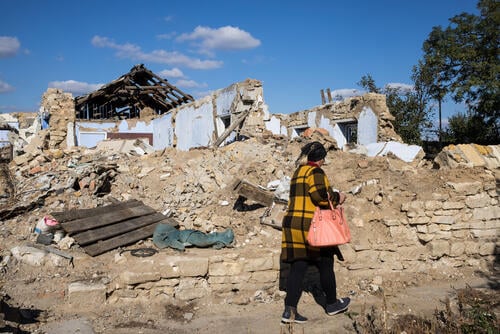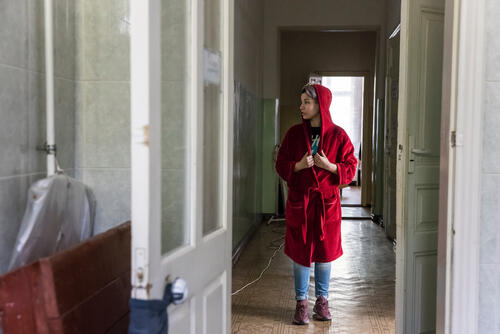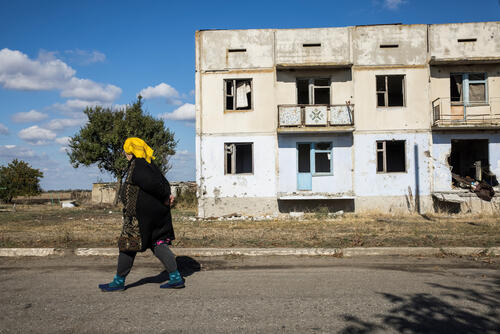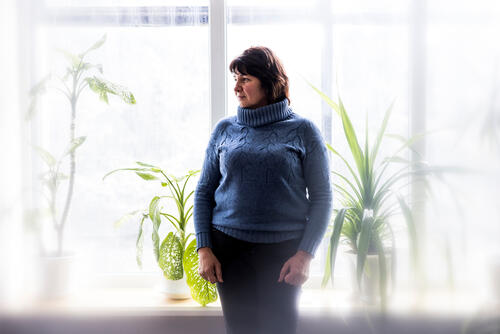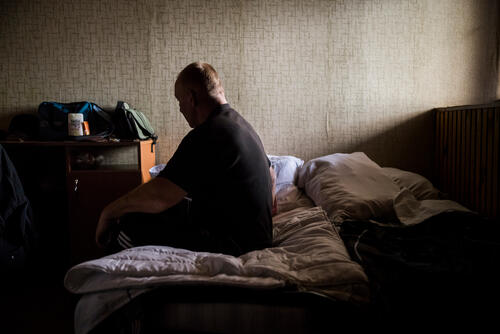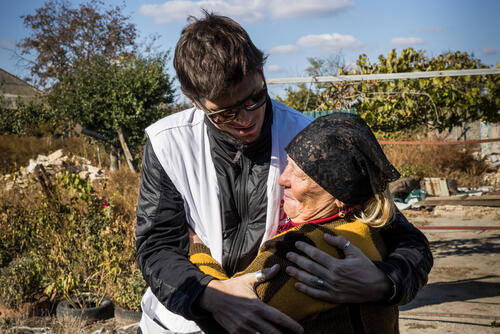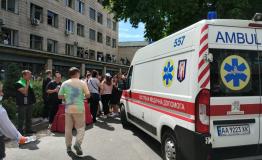A woman with short grey hair and a navy-blue medical uniform shows an underground room with beige walls covered in parallel tubes and wires connected to a small pendant lamp. Although the light is not very bright, it is present. The room is equipped with an examination couch, medical equipment, and drugs. If required, medical care can be provided here, and it is even possible to deliver babies.
“Patients gave birth here while the city was occupied of by Russian troops from February to March 2022”, says Anna Svesova, the director of a Ministry of Health (MoH) hospital in Trostianets, Sumy region, in northeastern Ukraine.
When the war escalated in Ukraine, the town was one of the first to be occupied. Svesova takes us on a tour of the underground labyrinth of which this room is a part: for almost two months, most of the hospital's departments were in these catacombs. Then the building was severely damaged.
“There were holes from shots that pierced the whole building. You could see the sky through them,” says Svesova. “It was very hard. But we survived.”
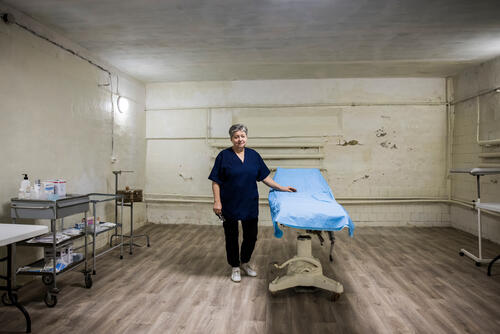
After Trostianets returned to Ukrainian control, Médecins Sans Frontières (MSF) helped to renovate the hospital building in 2023. This spring, however, shelling of the Sumy region increased significantly, and a blast from a nearby shell damaged the hospital again. The medical facility lost 184 windows, but all seven departments were up and running around the clock four days after the attack.
The constant bombardment of the frontline areas in the east, south and northeastern part of Ukraine, where the state doctors work, and the enormous grief of the patients take their toll on the mental health of the health workers, and personal problems and experiences also affect their psychological state.
MSF's mental health programme, a key component of the response in Ukraine, has helped the staff of the Trostianets hospital cope with the horrors of war: psychologists conducted sessions not only for patients but also for MoH doctors. These activities are also carried out in other regions of Ukraine close to the frontline, such as in the Donetsk and Kharkiv regions, where MoH doctors constantly work in emergency, including when mass casualties are being taken at medical facilities after missile shelling.
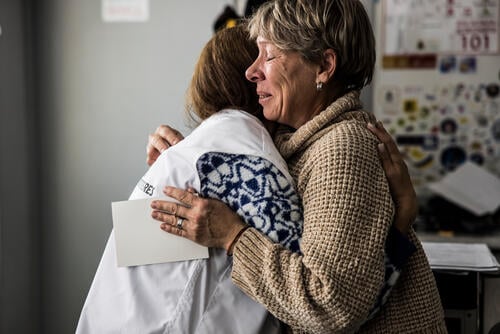
“In the first phase of the war, state doctors and psychologists worked themselves to exhaustion,” says Alisa Kushnirova, who supervises a team of psychologists at MSF working in the Kherson, Mykolaiv and Kirovohrad regions. “No one thought about taking care of themselves and their mental health, so people were exhausted and burnt out. That's why MSF launched a project to provide psychological support to the medical staff - to guarantee care for caretakers in the hospitals we supported.”
For the doctors, MSF psychologists conducted a series of group and individual sessions to help them develop mechanisms for recovery and rest, work through personal concerns and, most importantly, learn not to suppress their emotions. And because during the war, doctors work with people who have experienced occupation, displacement, injury, violence, and loss of home and loved ones, including as the result of the mass casualty missile attacks, such emotions accumulate in excess.
“The psyche is like a sponge: it absorbs all the information from patients, but it cannot process and squeeze it all out on its own, so if you want to cry and scream, you have to do it,” says Kushnirova. “This may be perceived as a weakness, but the ability to recognise and release such emotions is a great strength.”
The psyche is like a sponge: it absorbs all the information from patients, but it cannot process and squeeze it all out on its own, so if you want to cry and scream, you have to do it.Alisa Kushnirova, MSF psychologists team supervisor
Throughout Ukraine, MSF psychologists deliver psychological support tailored to patients' needs. In 2022 and 2023 alone, we provided 26,324 individual mental health consultations. Part of them were held in mobile clinics that provide medical and psychological care to people in the areas retaken by the Ukrainian army and small villages close to the hostilities in the Kherson, Donetsk, Mykolaiv and Kharkiv regions.
Sometimes people do not see their mental health as a priority when their basic needs for clean water, food, healthcare, and utilities are met. There are often no medical facilities in these areas because they have been destroyed, and there are no medical staff. The elderly people in these regions are particularly affected, as often they were unable to leave the areas due to mobility challenges. The constant worry can lead to the aggravation of health problems, such as cardiovascular disease and insomnia.
In the mobile clinics, MSF psychologists often explain to patients the importance of mental health and the impact it has on the quality of their lives. They advise patients on how to improve sleep quality, manage anxiety and tension, and conduct psycho-educational training for communities on how to deal with stress. Basic techniques and support for mental health can help prevent the onset of cardiovascular disease and mental disorders.
In many cases, the basic exercises recommended by specialists during group psychoeducation sessions and individual consultations help to stabilise the emotional state of patients. However, there are more complex cases that require long-term work. For instance, MSF psychologists provided psychological support to the survivors of a missile attack on a café in the village of Hroza, Kharkiv Oblast, in eastern Ukraine in early October 2023. The shelling caused the loss of dear ones to each of the 15 families living in this village of 330 residents, according to the authorities and the UN.https://ukraine.un.org/en/251228-un-report-links-russia-deadly-attack-ukrainian-village
“After the wounded of this attack were taken to hospital, our psychologists worked with them,” says Victoria Lepekha, MSF mental health supervisor. “There were six people with serious injuries: some of them in the head, with impaired brain activity and speech. They all lost their families. Some lost one, some lost two, some lost up to 15 relatives.”
“It has been a painstaking psychological work with people who are experiencing acute grief. They all need support: to listen to them, to sympathise with them, to hold their hands, even to cry with them,” she says. “There is also a work with survivor's guilt. It is a support search - how to go on living and what to rely on now.”
Long-term support is crucial to the successful recovery of patients experiencing grief and loss. In the Kharkiv region, for example, on request, MSF provided group counselling for women who had lost their husbands and sons at the frontline. This group of seven women has met at least ten times since August 2023 to discuss their experiences and pain and to share their thoughts about the war.
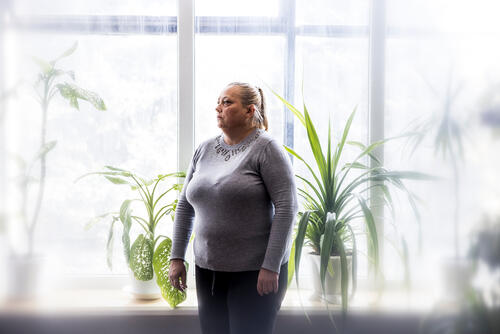
One of them is Natalia Rukhova, 56, originally from Pervomaiske. She lost her son in the war. As she shares her feelings during the session, she starts crying. “No one knows when [the war] will end and how long we will have to wait,” says Rukhova. “I am afraid that when it is over, the situation will be terrible and the psychological state of young and old will be terrible. People have lost a lot and now they have nothing. I do not know how we can bear it.”
Without a strategic approach to mental health in Ukraine, these fears of not being able to cope with the impact of the war can represent a big burden to the people, say MSF psychologists. An unstable mental state not only causes emotional pain but also affects physical health at any age.
Older people are more likely to face insomnia and cardiovascular disease, while middle-aged and young people are more likely to experience headaches, hormonal problems and miss their periods. War has a negative impact on children's cognitive abilities: developmental delays, speech problems, nightmares and enuresis become common. Some patients develop post-traumatic stress disorder (PTSD) and some even suicidal thoughts.

Among those affected by the hostilities, the willingness to seek psychological help is much higher now than at the start of the war in 2014. Before the full-scale invasion, having consultations with a psychologist was not something usual or available for many people in Ukraine.
Over the last two years MSF has contributed to expand the awareness about the importance of seeking mental health support and made services more available to people who have found a source of relief in these programmes, including children, teenagers, their parents, and elderly who were often seen by a psychologist for the first time.
Thanks to the advocacy work of international, local and governmental organisations, attitudes towards mental health in Ukraine are changing. There is less stigma, and more people are ready to share their experiences and emotions and to let tensions go.
"There is an understanding that it is necessary, and it helps," says the psychologist Inna Suzova.
Since the start of the full-scale war, mental health support has been and continues to be a key component of the MSF response in Ukraine. MSF mobile clinic teams provide basic healthcare as well as mental health counselling and psychoeducation. MSF staff render specialist healthcare training, including psychiatric care, mass casualty and mental health training for medical staff.
In Vinnytsia, MSF provides psychotherapy and medical services to people with war-related PTSD symptoms. In Cherkasy, the mental health component is part of a physiotherapy project for war-wounded and injured patients.



